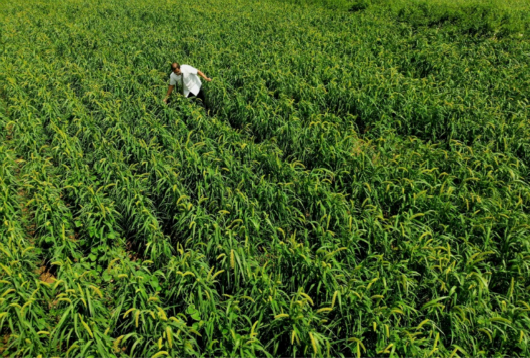
. > TOP STORIES
Experts explore China’s further rural reform
Author : Zhang Jie and Zhang Qingli Source : Chinese Social Sciences Today 2019-01-25

An expert checks the growth of millet in an agricultural ecological park in Tangyin County, Henan Province, in August 2018. The agricultural ecological park in Tangyin County has reduced and reutilized agricultural waste by creating an ecological recycling system. Photo: Li An/XINHUA
In late December 2018, the central rural work conference was held in Beijing. The conference stressed that it is necessary to prioritize the development of agriculture and rural areas and to implement the rural vitalization strategy in depth.
Some scholars said that a new round of rural reform is essential to adding momentum to rural vitalization and agricultural and rural modernization.
In recent years, China’s rural areas have seen great achievements in poverty alleviation, said Zhang Xiaoshan, a Member of the Chinese Academy of Social Sciences. In 2018, the central government subsidized local special poverty alleviation funds for 106.095 billion yuan, an increase of 23.2 percent over 2017. In 2018, more than 10 million people were lifted out of poverty. Under the premise of ensuring food security and an effective supply of agricultural products, the structural reform of the agricultural supply side has continued to deepen.
In terms of food security and an effective supply of agricultural products, Tong Zhihui, director of the Rural Governance Research Center at Renmin University of China, said that China’s annual grain output has been stable at more than 1.2 trillion jin (600 billion kg) for five consecutive years since 2013. With less than one-tenth of the world’s arable land, China produces a quarter of the world’s food and feeds nearly one-fifth of the world’s population.
Zhang said that in 2019, poverty alleviation is still the hard task for rural work. While completing the task of poverty alleviation, its quality also needs to be guaranteed. How to prevent the recurrence of poverty also needs to be addressed.
“We must prioritize the development of agriculture and rural areas through cadre allocation, factor allocation, capital investment and public services,” Zhang said.
First, it is important to implement policies on finance, taxation, land, credit and insurance to support the rural areas. Then we should cultivate a group of new professional farmers through targeted support policies, education and training.
In addition, Zhang continued, it is imperative to promote the balanced allocation of public resources between urban and rural areas and to realize substantive fair access. Moreover, the equal exchange of factors of production between urban and rural areas should be facilitated, and the institutional mechanisms need to be improved for integrated growth between urban and rural areas. Not only will rural factors of production flow to cities, but the advanced factors and quality resources of the urban areas also need to flow to the countryside.
Fang Xiangming, a professor from China Agricultural University, said that it is necessary to reform and innovate the agricultural production and management system. A new agricultural management system can greatly improve agricultural production efficiency, reduce production costs and improve economic efficiency.
Wang Xingguo, deputy secretary of the CPC Committee at the Shandong Academy of Social Sciences, said that a new round of rural reform must highlight green growth. Wang suggested accelerating the establishment of a subsidy policy system that is conducive to the green growth of agriculture and rural areas.
Improving the quality and safety of agricultural products should be a priority, Wang said, adding that the structural reform of the agricultural supply side should be the main measure to enhance quality.
Wang also suggested enhancing agricultural competitiveness through continuously improving agricultural innovation and total factor productivity.
Ye Shengtao made Chinese fairy tales from a wilderness
Ye Shengtao (1894–1988) created the first collection of fairy tales in the history of Chinese children’s literature...
-
How northern ethnicities integrated into Chinese nation
2023-09-18
-
Mogao caves
2023-09-12
-
Mogao Grottoes as ‘a place of pilgrimage’
2023-09-12
-
Time-honored architectural traditions in China
2023-08-29
-
Disentangling the civilizational evolution of China
2023-08-28
-
AI ethics in science fiction
2023-08-23













 2011-2013 by www.cssn.cn. All Rights Reserved
2011-2013 by www.cssn.cn. All Rights Reserved